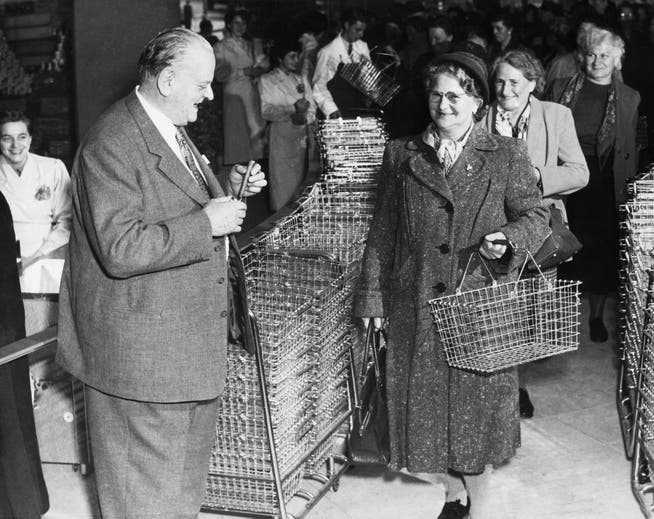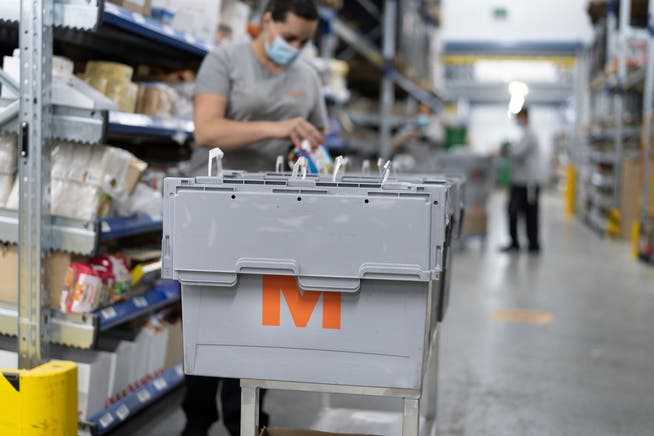The members of the cooperative will soon be able to vote on whether beer and wine will also be available for purchase at Migros in the future. The fact that Migros does not sell alcohol goes back to company founder Gottlieb Duttweiler. But “Dutti” was no purist.
Migros founder Gottlieb Duttweiler (1888–1962) in front of the Migros market in Oerlikon, photographed on April 9, 1960.
Anyone living in Switzerland or in neighboring countries will soon be able to vote on whether alcohol should also be available for purchase in Migros shops in the future. The only requirement for voting is that you are a member of a regional Migros cooperative or will become one by May 10th.
Anyone wishing to vote should be interested in how the country’s largest grocer came to be so far from selling alcohol and tobacco in its supermarkets. Are there principles behind it that you should think about before making a decision? Or is the gap in the range simply due to earlier circumstances?
Don’t piss women off
The question leads back almost to the beginnings of Migros 97 years ago and to its founding father Gottlieb Duttweiler. When Duttweiler had his first five Ford Ts, converted into sales vehicles, swarmed out in Zurich on August 25, 1925, just in time for the monthly payday, alcohol – like drinks in general – was not yet an issue. The range consisted of just six everyday products, all of which were non-perishable and unbreakable: coffee, soap, rice, coconut oil, sugar and “Hörnli” pasta.
But soon the idea of expanding the range came up and, in this context, the question of which drinks Migros should sell. Soft drinks were not very common back then. Duttweiler did not get any beer because the cartelized brewers boycotted him, as did many brand manufacturers. But getting into the wine business would certainly have been possible. According to the Duttweiler biographer Karl Lüönd, Migros could have gotten a liter of wine for 8 centimes, which would have been a big deal.
But Duttweiler refused. One reason was that he saw a danger of promoting alcoholism with cheap wine, as he said in an interview in 1952: “If we had introduced wine when Migros came up, the price would have been around 58 centimes per liter. That was an effective threat! Then many would have started drinking. . . or more. Of course, because it’s cheap, they would have drunk a lot.”

Gottlieb Duttweiler at the opening of the first Migros supermarket in Zurich.
Duttweiler did not want to risk this because he would have angered the housewives, who suffered from the fact that many men drank their wages in the pub. The women were Duttweiler’s most important, if not almost his only, allies at a time when he was harassed by the competition and the authorities for his aggressive pricing strategy and unconventional marketing methods.
Success story sweet cider
Giving up selling wine was all the easier for Duttweiler when he found an alternative business field. As a substitute for wine, according to Curt Riess, another Duttweiler biographer, Duttweiler bought the ailing company Non-Alcoholic Wines and Cannery Miles A.-G. and, to the annoyance of the brewers, made their sweet cider popular; as always with adventurously low prices, with which he boosted sales.
Thanks to the Migros campaign, sweet cider, which had not been systematically marketed anywhere before and, according to Riess, was drunk “only by old women or palsy young men eager for reform”, became a popular drink. The statistics from that time show how successful Duttweiler was in popularizing the sweet cider: Within five years, from 1927 to 1932, consumption in Switzerland rose from 1.5 million to 73.5 million liters, which corresponds to an almost fifty-fold increase.
From the same interview from 1952, however, it is also clear that for Duttweiler not to sell alcohol was by no means a dogma, but was related to the specific circumstances in the early years of Migros. The Migros founder explained that the risk of alcoholism later decreased for him because wine prices had risen.
When there was a problematic excess of wine in Switzerland, he once asked himself whether Migros wanted to sell local wine as a campaign to promote consumption, Duttweiler said in that conversation. However, the proposal was not well received at the delegate assembly of all Swiss cooperatives. He was “almost stoned”.
Zurich outvoted western Switzerland
The issue of wine sales officially became a topic in the 1940s, when Migros expanded into western Switzerland. Because on the Röstigraben – and partly also on this side – the regional cooperatives would have liked to sell wine. In 1948 there was a nationwide ballot. As the Migros weekly “Wir Brückenbauer” of April 9, 1948 shows, seven of the twelve cooperatives voted in favor of selling wine: Bern, Geneva, Lausanne, Lugano, Lucerne, Neuchâtel and Solothurn.
On the other hand, there were only five (Aargau, Basel, Schaffhausen, St. Gallen and Zurich), although Zurich was by far the largest cooperative. Because the members of the cooperative in Zurich said no with a large majority, this camp ultimately prevailed with 15,146 to 12,785 votes. The cooperatives whose members had voted to sell wine also adhered to the ban.
Strengthened by this vote, the ban on alcohol developed more and more into a kind of principle over the years. Duttweiler himself said in 1952 that one should not give up such a “right principle” after 27 years for reasons of opportunity.
However, selling alcohol simply didn’t seem to be a priority for him: “I have such a beautiful imagination that I can always bring new business, it doesn’t have to be wine,” he said in the interview. He also left the back door open with the postscript that the very last thing “perhaps in the next fifty years will be wine sales”.
Until Duttweiler’s death in 1962, alcohol was no longer an issue at Migros. The question did not come up again until 1983, because that was the year in which the cooperatives presented their revised statutes to their members for approval, which also included the ban on the sale of alcohol and tobacco. In the course of this ballot, nine out of ten cooperatives (with the exception of Geneva) also formally enshrined the ban on alcohol sales in their statutes and contracts.
Growing splits
Step by step, however, alcohol made its way into the Migros universe, for example with the takeover of Globus (1997) and Denner (2007), both of which offer wine. Alcohol is also sold in the Migros formats Migrolino and VOI, only in the stationary Migros markets it is still missing.
The balancing act became most obvious when the Migros online shop was renamed from Leshop.ch to Migros Online. There was alcohol in the online supermarket bought by Migros, and in March 2020 the Migros Assembly of Delegates (the “Migros Parliament”) voted to keep the alcohol offer in the online channel even after the name change to migros.ch. So if you shop online, you can definitely buy wine and beer from Migros.

An employee compiles a customer order in a Migros Online warehouse, logistics and distribution center, photographed on June 3, 2021 in Pratteln, canton Basel-Landschaft.
That disturbed the delegate Renata Georg. The trustee and councilor of the Migros Cooperative Zurich, who has been a member of the Delegates’ Assembly of the Migros Cooperative Association since 2016, found that the statutes would be strained because online and offline are increasingly merging.
She therefore wanted the members of the cooperative to be able to express their opinions on the subject of alcohol sales again – similar to 1983. Together with four other delegates she got the process rolling, which is now leading to a nationwide vote on the alcohol sales ban.
